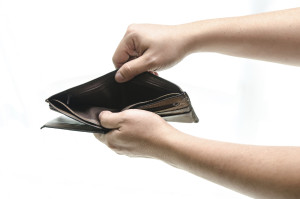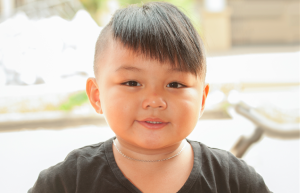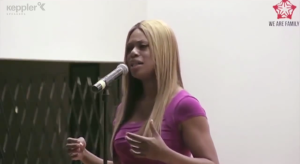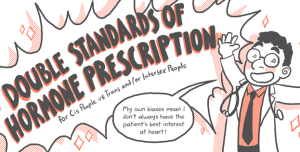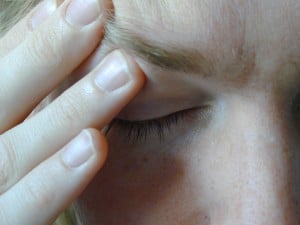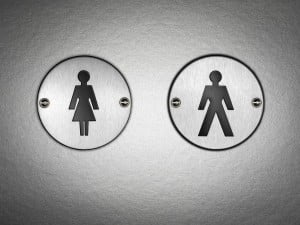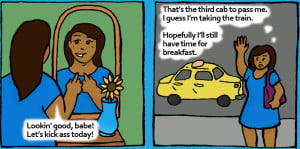For way too long, we’ve treated “poor” like a four-letter word.
We’ve put a lot of shame and stigma on poor people, even within our own communities of activists or marginalized folks. We’ve saddled conversations about class with stereotypes and myths.
And the impact is tangible, real, and hugely negative.
Stigma is part of a self-perpetuating cycle of marginalization for any community. Abortion stigma reinforces anti-abortion sentiment, which further marginalizes folks targeted by reproductive rights restrictions and strips them of agency and power. Body shame reinforces unrealistic beauty standards, which keep all of us further away from self-love and self-empowerment.
And stigma around issues of poverty and class perpetuate extreme poverty in myriad ways.
But stigma also has immediate consequences – and personal ones. Folks who embody a stigmatized identity or characteristic often suffer for it, and the poor are no exception. Stigma around socioeconomics leads to social tension, profiling and injustice, and a loss of political power. It can also lead to depression, substance abuse, low self-esteem, and other individual challenges.
Feminists have long fought for a world without stigma.
We’ve pushed back against people using “gay” as an insult. We’ve championed abortion, on demand, without apology. We’ve encouraged body love in a world of body shame. We’ve even embraced “bossy.”
But often, feminism can operate without a class analysis. And sometimes, we forget that focusing on economic justice and class equality are just as integral to an intersectional feminist movement as conversations about race, sexuality, and gender identity.
Poverty is a feminist issue. It disproportionately impacts women, and it stops us from achieving the equitable world we’re united in envisioning together.
And it’s time for us to end the stigma surrounding poverty and financial insecurity.
We need to come together and say, again and again, that there is nothing shameful about anyone’s financial situation. We need to stand together in solidarity with those who live in poverty, and we need to be champions for their humanity and their rights.
Poor is not a four-letter word.
These are just a few reasons why.
1. We’re Worth More Than Our Wealth
Allow me to repeat myself: We’re worth more than our wealth.
You’re worth more than your cash flow. You’re worth more than your income. You’re worth more than the credit cards in your wallet.
Our society routinely denigrates the poor. Folks don’t think poor people deserve to go to swimming pools or eat steak or get a little help to make ends meet. Attempts to give low-wage workers a raise are met with contempt.
Because we wrongly see poverty as a choice, we tie people’s societal worth to their wealth. Because we wrongly see poverty as a choice, we’ve decided poor people don’t deserve to be treated like everyone else.
That’s not okay.
When we tie the value of a human being to a job or a salary point or a poverty line – or even a skill – we dehumanize them. When we decide people who cannot afford things don’t deserve them, we deny them full participating in society.
The fight to end shame and stigma around poverty and financial insecurity is a fight to ensure that people who struggle to make ends meet or live paycheck-to-paycheck aren’t denied the opportunity to be seen for the people they are, and not the myths and stereotypes that rob them of their humanity.
2. For Most of Us, ‘Poor’ Will Be Our Own Experience At Some Point
Four out of five Americans will struggle financially in their lifetimes.
Over 40 million Americans live below the poverty line. Over 97 million additional Americans are low-income.
19 million live in “extreme poverty.”
The truth is that many of us will, at some point in our lives, experience financial insecurity.
We may not cross the poverty line, but we will find ourselves living dangerously close to it. It’s statistically likely that at some point we’ll fall on hard times, or even into the cycle of poverty.
One of the ways stigma and shame go unchecked is our own ability to see people as “other.” After all, it’s easier not to care about issues that aren’t your own, or to pass judgment on experiences that don’t look or feel like yours.
That’s why the next time any of us encounter poor-bashing, we might do well to recognize that we’re never too far from being its target.
3. It Isn’t Easy for Us to Lift Ourselves Out of It
Being poor isn’t a choice, although a lot of discourse in our culture reinforces the idea that it is.
The myths that poor people should “pull themselves up by their bootstraps” or that they “made bad decisions” are bullshit. But when we attach shame and stigma to poverty and financial insecurity, we reinforce the ideas that fuel them.
Poor people can’t just work super hard and get themselves out of poverty. Not every time. It simply doesn’t work that way – not for the single moms living paycheck-to-paycheck, not for the homeless queer youth with no networks and no financial support systems, not for the women of color working low-wage jobs to survive.
Politicians and billionaires would love to trick us all into thinking that the poor are simply people who made their own beds. They would love us to imagine a world in which hard work, and hard work alone, will keep us afloat and get us ahead. After all, often the work fuels the machines that keep the rich rich – and politicians sell us class liberation in order to win elections.
But the truth is that being poor isn’t something you click three times and close your eyes and disappear from. It isn’t something you can fix up easy peasy, lemon squeezy with a job.
Poverty isn’t an individual problem. It’s a cultural epidemic. And nobody should feel ashamed for being entangled in it.
4. It Doesn’t Say Anything About Who We Are
Consider this your daily reminder that poor people, like any other community, are not a monolith. But more importantly, poor people aren’t a set of myths and stereotypes come to life, either.
As feminists, we would probably cringe at a racist joke, call someone out if they were blatantly sexist, or stop someone in their tracks who perpetuated homophobia and transphobia – and rightfully so.
We need to be just as vigilant about smashing the cultural perception of poor people that paints them as lazy, irresponsible, unreliable, and even unstable.
People fall into financial insecurity in a variety of ways, especially in our current economy. Someone’s socioeconomic status is in no way an indicator of who they are. And yet, classist stereotypes often rely on lumping poor folks together and putting them into undesirable categories.
Don’t get it twisted: Poor people aren’t natural-born criminals. Poor people aren’t working hard at avoiding working hard. Poor people aren’t lazy moochers waiting for someone else to take care of them. They’re complex and layered people with their own stories and set of circumstances.
And they deserve the compassion and respect we give to folks with more resources and bigger paychecks.
5. Poverty Is Not Failure
But treating it like it is stops people from getting the support they need.
One of the thrulines of most kinds of poor-bashing is the idea of poverty as failure. If poor people are poor because of their own decisions, then poverty is failure. If poor people could easily lift themselves out of poverty, then all poverty is failure.
But being poor doesn’t make you a failure.
Epidemic levels of poverty, however, do signal that we’ve all failed – at creating a culture that’s accountable for supporting those who are most vulnerable.
When we communicate, in our culture, that being poor is shameful and that we don’t intend to support folks who are living in poverty, we also stop people from reaching out for help. And that’s precisely one of the reasons that class bias persists.
Our cultural conversations surrounding poverty are a huge obstacle to ending it once and for all. We blame poor people for poverty without taking a hard look at how our society creates and fuels the systems of power that keep them disempowered.
We blame poor people for poverty and then use their financial insecurity and marginalization as excuses to police and restrict their lives.
We shame the poor into invisibility, and then we abandon them.
6. The Economy Is Rigged – And We All Need to Be in This Together
Whenever I write about intersectionality, I stand firm that bottom-up politics lead to more widespread liberation and empowerment.
When we focus our activism and organizing on the needs and demands of the most marginalized, we all stand to benefit – even those of us with more privilege or different experiences.
When we advocate for the absolute rights and equality of trans women, we also lift up cis women who suffer, too, from sexism and misogyny. When we demand an end to workplace discrimination against queer folks, we create work environments that are less hostile to anyone living outside of “the norm.” When we push for an end to racist policing, we are pushing for communities where we all feel protected – and not targeted – by law enforcement.
And when we stand in solidarity with the less financially fortunate, we all stand to benefit.
We know that trickle-down economics don’t work – but that policies focused on lifting up the poorest people in this country will benefit everyone economically. We know that raising the minimum wage doesn’t just help minimum wage workers – it gives all of us a pathway to earning a more fair pay and shaping more equitable workplaces. And we know that the wealth gap is widening – and leaving more and more of us at the bottom, fighting for scraps.
We all have a lot to gain from creating a more equitable and fair economy.
We all have a lot to gain from fostering a culture where everyone – regardless of their income or class status – has a fair shot.
But we’re not going to accomplish those things until we put the stigma and shame attached to poverty in the past.
7. When We Don’t Talk About Class, It’s Not Possible for Us to Confront It
The most important thing that could come out of eliminating the shame and stigma we attach to poverty is that it would give us an opportunity to finally look class differences in the eyes and destroy them.
When shame and stigma prevent poor people from asking for help, telling their stories, or living openly, our conversations about money and power and class suffer.
When those with class power succeed and trick us into believing poverty is shameful and embarrassing, our ability to formulate community solutions to end poverty or think about how to better support lower-class folks deteriorates.
We know that class difference is impacting our lives. A lot of us are fed up with the 1%, and most of us are getting screwed over by them.
But until we all stand, united, in an effort to end the shaming of poor people, we’ll never make much progress in ending the class war.
***
It’s going to take a lot of work to change policies and cultural attitudes around issues of class, and it’s work that none of us can take on by ourselves. But ending shame and stigma is something we all have the power to do – simply by refusing to buy into it.
Every single day, we make the choice to perpetuate or destroy stigmas.
We can fuel myths and stereotypes about different sorts of people, or places, or families, or communities – or we can allow people to speak for themselves and articulate their own needs and desires.
We can sit idly by while our culture puts people into boxes or we can do all we can to help people break out of them.
When we encounter poor-bashing, we make those choices. And the sooner we begin pushing back, the sooner we can get down to the hard work of building a more equitable world.
[do_widget id=’text-101′]
Carmen Rios is a Contributing Writer for Everyday Feminism. She splits her time disparately between feminist rabble-rousing, writing, public speaking, and flower-picking. A professional feminist by day and overemotional writer by night, Carmen is currently Communications Coordinator at the Feminist Majority Foundation and the Feminism and Community Editor at Autostraddle. You can follow her on Twitter @carmenriosss and Tumblr to learn more about her feelings.
Search our 3000+ articles!
Read our articles about:
Our online racial justice training
Used by hundreds of universities, non-profits, and businesses.
Click to learn more


